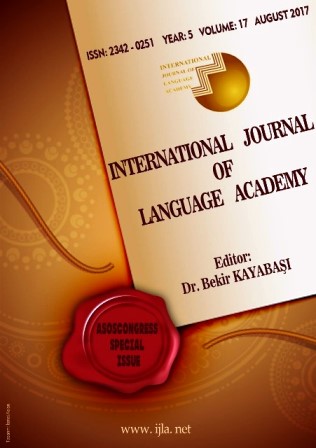Author :
Abstract
Bildungsroman’ın gelişim tarihinde Goethe Bildung terimini ilk ortaya atan kişi olarak kabul edilir ve Wilhelm Meister’in Çıraklık Yılları adlı eserinde gelişim veya olgunlaşma olgusunu bir kurgusal gerçeklik yoluyla yansıtır; yine de Romantik akımın varlığı ve önemi inkâr edilemez. Romantiklerin bireyin kişisel gelişimine olan edebi yaklaşımları zaten önceden beri “olgunlaşma” temeli üzerine kuruluydu ve bu temayı Bildungsroman geleneğine çok benzer bir şekilde kullandılar. William Wordsworth Tintern Abbey adlı şiirinde kişinin ilk gençlik yıllarını bir Bildungsroman karakterinin olgunluğa geçiş süreciyle eşdeğer bir biçimde anlatır. Buradaki olgunlaşma teması doğa ve kırsal yaşamla iç içedir ve özellikle doğa bu olgunlaşmanın ve şairliğin kaynağı olarak yansıtılır. Şairin gençlikten olgunluğa geçiş ve edebi yapıtı oluşturma sürecinde doğa önemli bir destekçidir. Neticede, bir çeşit ortak çalışma içerisinde doğa şiirin ortaya çıkış sürecinde şairin yardımcısı rolündedir. Bu da şairin gelişimini tamamladığı anlamına gelir. Çalışmamızın amacı, bu şiirin kendi oluşum ve yazım aşamasını nasıl tersyüz ettiğini ve doğa temasının şairin gelişim sürecindeki önemli rolünü ortaya koymaktır.
Keywords
Abstract
In the Bildungsroman development history, Goethe is generally accredited for having introduced Bildung, making formation or becoming a fictional reality with regard to character representation strategies, in his Wilhelm Meisters Lehrjahre, but the importance of romanticism is no less significant. Romantics in their literary concern with the development of an individual subject already had thematically treated the formative principle and used it in a very similar to the Bildungsroman way of thematic representation. Tintern Abbey by William Wordsworth shows an individual in his early adulthood corresponding to the moment in the Bildungsroman of the character entering upon maturity. The principle of formation here is conceived as interrelated with nature and rural setting, and nature, in particular, is the source of formation and of becoming not simply of a mature personality but of a poet. In the process of development of a poetic mind from youth to maturity, concerning the formation as a poet, nature co-participates – in matters of “emotion recollected in tranquillity” – in the process of literary composition. As a result, in a kind of co-authorship, the poem is being written by the assistance of nature which means that the poet achieves formation. To disclose this interpretative aspect is the aim of our study as it is out attempt to show how the poem deconstructs its own process of composition, the way in which it is actually being written, and hence the Tintern Abbey, besides being a Bildungsgedicht or Lehrgedicht, is also a self-reflexive poem, a metapoem.





